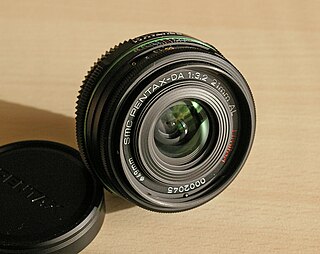
The Pentax Optio S50 is a digital compact camera announced by Pentax on August 16, 2004. It contains an early example of a selective colour filter.

The Pentax K-x is a 12.4 megapixel digital single-lens reflex camera, announced on September 16, 2009. Pentax K-x uses an Exmor, Sony-made sensor. In some cases it even approaches the quality produced by full-frame DSLRs like the Nikon D700 and the Canon 5DMkII, both with larger sensors. The Pentax K-x is suitable for low light conditions for both still and video photography.

The Pentax 645D is a medium format digital SLR camera announced by Pentax on March 10, 2010.
The smc Pentax-DA* 55mm f/1.4 SDM lens is a professional prime lens for the Pentax K-mount. It is designed for portrait use with a 35mm equivalent focal length of 82.5mm. The lens features weather sealing, an SDM ultrasonic motor for quiet autofocus, and has 9 rounded diaphragm blades for smoother bokeh. Autofocus speed is similar to an equivalent screwdrive lens.

Pentax K-01 is a mirrorless interchangeable-lens camera announced in February 2012. It uses the Pentax K mount.

The Pentax Q10 is a rangefinder-styled digital mirrorless interchangeable lens camera announced by Pentax on September 10, 2012. It has minor improvements over the model it replaced—the original 'Q'.
The Pentax Q7 is a compact digital mirrorless interchangeable lens camera announced by Pentax on June 12, 2013. While the camera has a larger sensor than its predecessors, the Q and Q10, it is compatible with existing Q series lenses.
The Pentax Q-S1 is a compact digital mirrorless interchangeable lens camera announced by Ricoh under the Pentax brand on August 4, 2014. It replaces the Pentax Q7, and is part of Pentax' Q system, the most compact digital interchangeable lens camera system as of September 2014, with crop factors ranging from 4.6 to 5.6.
The Pentax MX-1 is a digital compact camera announced on January 7, 2013.
The Pentax XG-1 is a DSLR-like ultrazoom bridge camera announced by Pentax on July 15, 2014. At the time of its release, it had the third longest reach of any compact camera, with a maximum of 1248mm equivalent focal length, after the Nikon Coolpix P600 at 1440mm, and the Sony Cyber-shot DSC-H400 at 1550mm, both announced in February of the same year. A fourth camera, the Kodak Pixpro Astro Zoom AZ651, announced in January with a maximum focal length of 1560mm, has yet to make it to market, as of February 2015.
The Ricoh WG-4 is a digital compact camera announced by Ricoh on February 5, 2014, successor to the Pentax WG-3. It is advertised as water-proof to 14m, shock-proof to drops from up to a 2m height, crush-proof to 220 pounds of force and freeze-proof to -10 degrees Celsius.
The Ricoh WG-20 is a digital compact camera announced by Ricoh on February 5, 2014. It replaces the Pentax WG-10 and is rated as "waterproof to 33 feet, shockproof from drops of up to five feet, coldproof to 14 degrees Fahrenheit and crushproof, withstanding up to 220 foot-pounds of force" by its manufacturer.

The Pentax K-S1 is a midrange DSLR camera announced by Ricoh on August 27, 2014. It has a 20 megapixel sensor — new to the Pentax line-up — and an anti-aliasing filter simulator as previously seen in the Pentax K-3. Also adopted from the K-3 is compatibility with the Pentax FluCard, which allows wireless tethered shooting and wireless download of images from the camera.
The Pentax X90 is a superzoom bridge camera announced by Pentax on February 24, 2010.

The Pentax Optio I-10 is a digital premium compact camera announced by Pentax on January 25, 2010. Its design is an example of retro-styling, based on the company's classic Auto 110 micro-SLRs. It is marked out as a premium compact by its inclusion of in-body image stabilisation, optional infra-red remote control, 720p video and dynamic range settings.

The Pentax Optio H90 is a digital compact camera announced by Pentax on January 25, 2010. It was launched under a new "functional beauty" design paradigm and was described as exhibiting "pleasant minimalism". It is compatible with Eye-Fi wireless SD cards and supports 720p video.

The Pentax smc DA 21mm F3.2 AL Limited is a moderate wide angle lens announced by Pentax on February 13, 2006. It is one of the five very compact "Limited" prime lenses for APS-C format cameras. Like its siblings, it was replaced in 2013 with a version that is HD-coated and has rounded aperture blades.
The Sony Cyber-shot DSC-RX1R II is a digital compact camera with a full frame sensor, announced by Sony on October 14, 2015. It is the first camera in mass production featuring a continuously variable optical low pass filter. In contrast with conceptually related technology debuted in the Pentax K-3 and subsequently carried by other Pentax models, Sony's technology works at any shutter speed.

The Pentax K-70 is a 24 megapixel compact APS-C digital SLR camera announced by Ricoh on June 8, 2016. In contrast to the previously introduced APS-C flagship K-3 II, it includes a flash, flip-out display and built-in WiFi. In common with that camera, the K-70 is capable of Pixel Shift Resolution images, which provide higher colour resolution and require the camera to be stationary. It is the first Pentax camera to also include on-sensor PDAF elements that support hybrid autofocus, enabling continuous autofocus during video capture.

The Pentax KP is a 24 megapixel compact APS-C digital SLR camera announced by Ricoh on January 25, 2017. It features a PRIME IV image processor with an "image accelerator unit" that supports its operation up to ISO 819,200. It has a 1/6000s conventional and 1/24,000s electronic shutter. In terms of bracketing modes, it adds depth of field and shutter speed bracketing.












